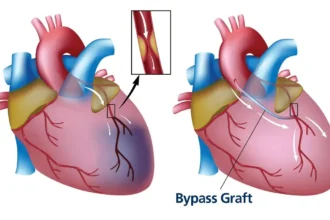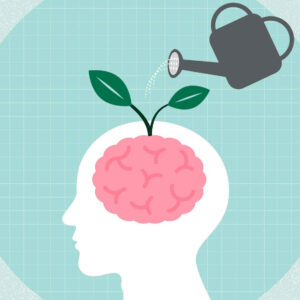In this blog post, we will explore the factual data behind the detrimental impact of negativity on our well-being and discuss strategies for coping with negative thinking.
It’s time to prioritize our mental and physical health by cultivating a more positive outlook on life.
Mental Health Effects
Negative thoughts can have a significant impact on mental health, leading to a range of problems such as anxiety and depression.
Negative thoughts can include self-criticism, pessimism, rumination, and catastrophizing, among others.
The relationship between negativity and anxiety
The relationship between negativity and anxiety is particularly strong.
Negative thoughts can trigger anxiety by creating a sense of fear or uncertainty about the future.
This can lead to a cycle of negative thinking and anxiety, where the negative thoughts fuel the anxiety, and the anxiety reinforces the negative thoughts.
Depression and the role of negative thinking
Depression is also closely linked to negative thinking.
Negative thoughts can contribute to feelings of hopelessness, sadness, and a lack of motivation, which are common symptoms of depression.
The more negative thoughts an individual has, the more likely they are to experience depression.
The role of negative thinking in depression is further compounded by the fact that negative thoughts can become automatic and habitual.
This means that individuals with depression may not even be aware of their negative thinking patterns, making it challenging to break the cycle.
It’s essential to recognize the impact of negative thinking on mental health and take steps to manage it effectively.
This can involve techniques such as cognitive-behavioral therapy, mindfulness, and positive thinking exercises.
By learning to identify and challenge negative thoughts, individuals can improve their mental well-being and reduce the risk of developing anxiety and depression, to overcome the effect of negativity on mental and physical health
Physical Health Effects
Stress can have significant consequences on the body, both in the short and long term.
Prolonged stress can lead to a range of physical health problems, including high blood pressure, heart disease, digestive problems, and weakened immune function.
The effects of negativity on the immune system
Negativity can also have a significant impact on the immune system.
Negative emotions such as:
- stress
- anxiety
- and depression can weaken the immune system
making individuals more susceptible to infections and illnesses.
Furthermore, negative emotions can have a significant impact on cardiovascular health.
Negative emotions such as:
- anger
- anxiety
- and hostility have been linked to an increased risk of heart disease
- stroke
- and other cardiovascular problems.
This is because negative emotions can trigger the release of stress hormones, which can raise blood pressure and heart rate, leading to damage to the cardiovascular system over time.
It’s essential to recognize the impact of negative emotions on physical health and take steps to manage them effectively.
This can involve stress-reducing techniques such as:
- exercise
- meditation
- and relaxation exercises
- as well as seeking support from mental health professionals.
By taking proactive steps to manage negative emotions and stress, individuals can improve their physical health and overall well-being, to overcome the effect of negativity on mental and physical health.

Cognitive Functioning
Negativity can have a significant impact on cognitive functioning, including memory, decision-making, and overall cognitive decline.
Negative thoughts can contribute to cognitive decline by increasing stress levels, which can damage the brain’s structure and function over time.
How negative thoughts affect memory and decision-making
Negative thoughts can also affect memory and decision-making by impairing attention, reducing the ability to focus and concentrate, and interfering with the retrieval of stored information.
Prolonged negative thinking can lead to cognitive distortions, making it challenging to process information accurately and objectively.
The role of negativity in cognitive disorders such as dementia
Chronic stress and negative emotions can accelerate the progression of cognitive decline in individuals with dementia, making it more challenging to perform daily tasks and maintain independence.
It’s essential to recognize the impact of negativity on cognitive functioning and take steps to manage it effectively.
This can involve techniques such as:
- cognitive-behavioral therapy
- mindfulness
- and positive thinking exercises
By learning to identify and challenge negative thoughts, individuals can improve their cognitive functioning and reduce the risk of developing cognitive disorders such as dementia.
Additionally, engaging in activities that promote cognitive health, such as:
- reading
- puzzles
- and social interaction
Can help maintain cognitive function and prevent cognitive decline, to overcome the effect of negativity on mental and physical health

Behavioral Effects
Negativity can have significant behavioral effects, including a connection to unhealthy coping mechanisms and addictive behaviors.
Negative emotions can trigger a range of unhealthy coping mechanisms, such as:
- substance abuse
- overeating
- and avoidance
which can have detrimental effects on mental and physical health.
Negative emotions and their influence on addictive behaviors
Furthermore, negative emotions such as:
- stress
- anxiety
- and depression
can influence addictive behaviors, leading to a higher risk of developing substance abuse disorders and other addictive behaviors such as gambling and shopping addiction.
The impact of negativity on relationships and social interactions
Negativity can also impact relationships and social interactions.
Negative emotions can lead to social withdrawal, avoidance, and conflict, making it challenging to form and maintain healthy relationships.
This can further contribute to feelings of isolation, loneliness, and depression.
It’s essential to recognize the impact of negativity on behavior and take steps to manage it effectively
This can involve techniques such as cognitive-behavioral therapy, mindfulness, and stress-reducing activities.
By learning to identify and manage negative emotions and developing healthy coping mechanisms, individuals can improve their behavioral health and maintain healthy relationships.

Techniques for managing and reducing negative thoughts
Negative thoughts can be overwhelming and can have a significant impact on our mental and emotional well-being.
Here are some techniques for managing and reducing negative thoughts:
- Cognitive restructuring: This technique involves identifying and challenging negative thoughts, replacing them with more positive and realistic ones.
- For example, if you find yourself thinking, “I’m a failure,” challenge that thought by asking yourself, “Is that really true? Have I never succeeded at anything?” Then replace the negative thought with a more positive one, such as “I may have failed at this particular task, but I have accomplished other things in my life.”
- Mindfulness meditation: Mindfulness meditation involves paying attention to your thoughts and feelings without judgment.
- This can help you become more aware of negative thoughts and emotions as they arise, and develop a more accepting and non-judgmental attitude towards them.
- Gratitude practice: Focusing on what you’re grateful for can shift your focus away from negative thoughts and towards positive ones.
- Try making a daily habit of writing down three things you’re grateful for each day.
- Exercise: Regular exercise can help reduce stress and improve your mood, making it easier to manage negative thoughts.
- Talk to someone: Talking to a trusted friend or family member, or seeking professional help from a therapist, can provide a supportive outlet for expressing and managing negative thoughts.
- Engage in activities you enjoy: Doing things you enjoy can help boost your mood and distract you from negative thoughts.
- Make time for activities that bring you joy, such as reading, listening to music, or spending time outdoors.
Remember that managing negative thoughts takes time and practice.
Be patient and kind with yourself as you develop new habits and strategies for managing negative thoughts, to overcome the effect of negativity on mental and physical health
FAQs
- How does negativity affect mental health?
Negativity can have a significant impact on mental health, including increased stress, anxiety, and depression.
- Can negative thinking affect your physical health?
Negative thinking can also affect physical health, such as weakened immune system and increased risk of chronic diseases.
- How does a negative person affect you?
A negative person can affect you by bringing down your mood and energy, causing stress and anxiety, and creating a toxic environment.
- How do emotions affect your physical health?
Emotions can affect physical health by influencing things like heart rate, blood pressure, and immune function.
For example, stress and anxiety can increase heart rate and blood pressure, leading to a higher risk of heart disease.
Conclusion
Life is a journey full of ups and downs, and negative thoughts are a natural part of that journey. However, by using techniques such as:
- cognitive restructuring
- mindfulness meditation
- gratitude practice
- exercise
- talking to someone
- and engaging in enjoyable activities
We can manage and reduce the impact of negative thoughts on our lives.
Remember to be patient and kind with yourself as you navigate the challenges of life, and always strive to focus on the positive and make the most of every moment.
You may also be interested in: Signs of Negative Energy in a Person










